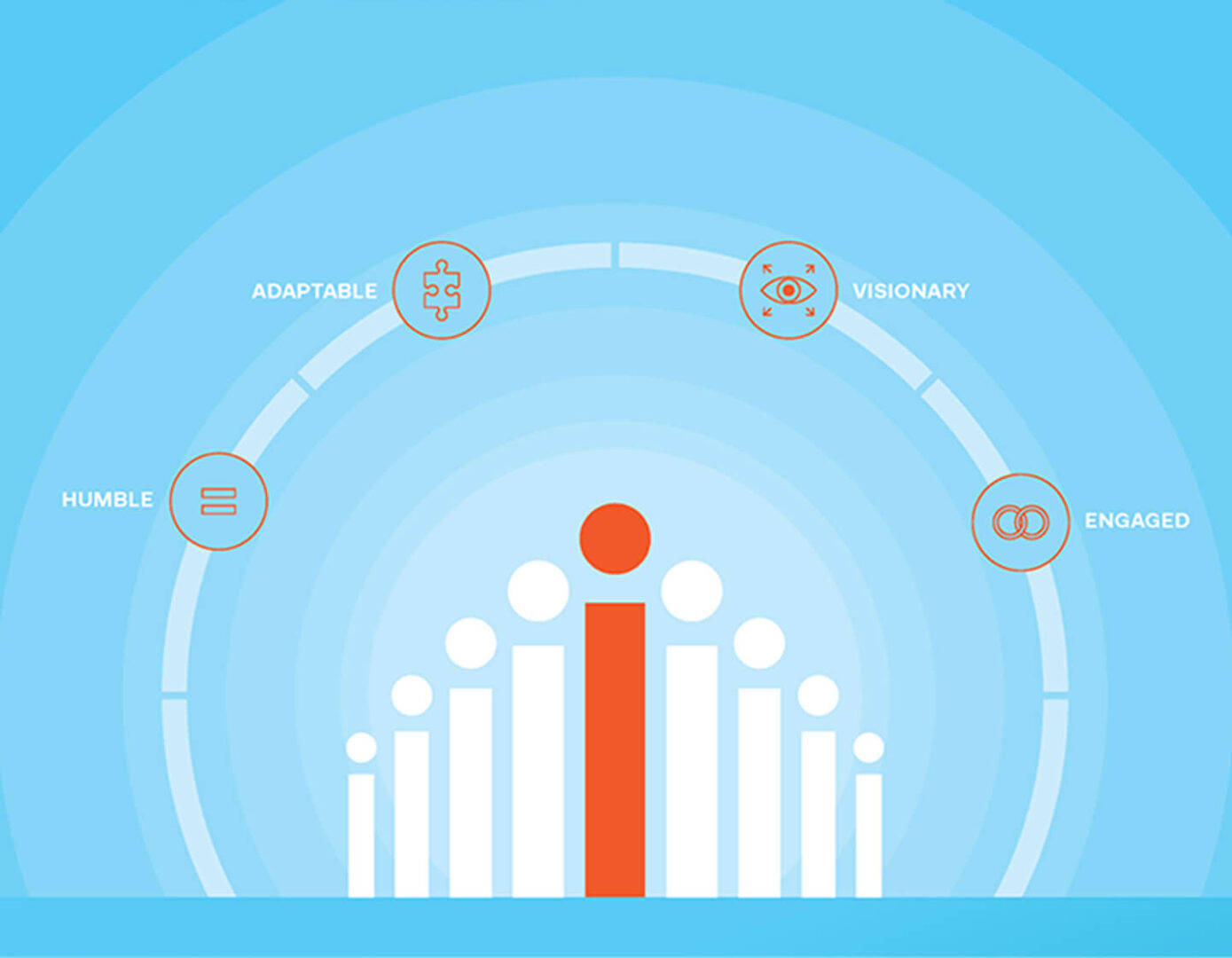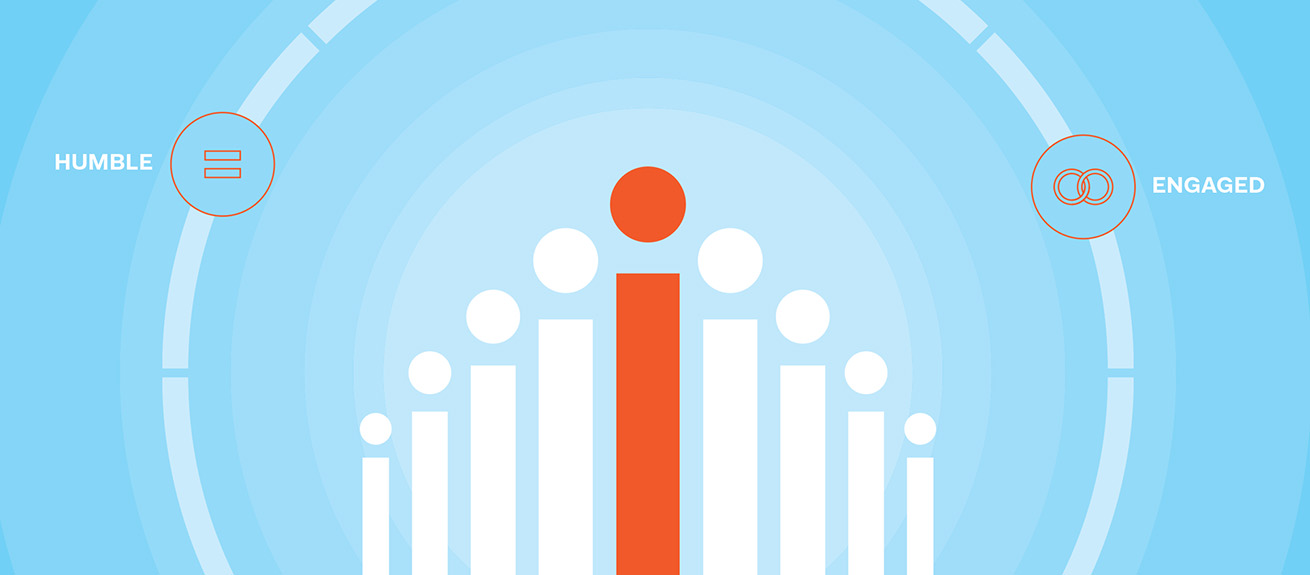
Redefining Leadership for a Digital Age
What does it mean to be an effective leader in an environment characterized by increasing digital disruption?
To address this question, the DBT Center undertook a major study along with specialist HR Consultancy metaBeratung. Data was collected from two sources: a survey of 1,042 executives, and in-depth interviews with nineteen digital leaders, all conducted between October 2016 and January 2017.
The research revealed that leadership effectiveness in disruptive environments shared many of the same characteristics as leadership in more stable environments, but with a few notable differences. We were able to identify a number of key competencies and business behaviors of Agile Leaders who thrive in this type of environment.
Four characteristics distinguish agile from non-agile leaders. Agile leaders are:
- Humble: They are able to accept feedback and acknowledge that others know more than they do.
- Adaptable: They accept that change is constant and that changing their minds based on new information is a strength rather than a weakness.
- Visionary: They have a clear sense of long-term direction, even in the face of short-term uncertainly.
- Engaged: They have a willingness to listen, interact, and communicate with internal and external stakeholders combined with a strong sense of interest and curiosity in emerging trends.
n addition, we found that Agile Leaders exhibited three key behaviors helping them to successfully navigate disruptive environments. They are:
- Hyperawareness: They are constantly scanning internal and external environments for opportunities and threats.
- Making Informed Decisions: They make use of data and information to make evidence-based decisions.
- Executing at Speed: They are able to move quickly, often valuing speed over perfection.
We found that Agile Leaders, those leaders who rated highly on the competencies and behaviors mentioned above, tended to significantly out-perform other leaders on measures such as work engagement and leadership effectiveness.
Research Information & Knowledge Hub for additional information on IMD publications
- How disruption is redefining leadership
- Redefining leadership for a digital age
- How disruption is redefining leadership
- Redefining leadership for a digital age
Research Information & Knowledge Hub for additional information on IMD publications
Research Information & Knowledge Hub for additional information on IMD publications

AI is reshaping careers, but future-proof skills aren’t what you think. Vision, expertise, and deep knowledge - not hype - are key to success in an AI world.

This episode takes you behind the scenes of a recent gathering led by the World Business Council for Sustainable Development together with IMD, where David Bach sat down with two sustainability leaders.

All organizations should have a plan to secure trust during, after (and even before) a crisis hits. Here are a host of examples, good and bad, to learn from.
Medacta Group SA is a rising star in the orthopedics market, achieving global success through innovative products and techniques, with a particular emphasis on minimally invasive techniques that bring meaningful value to its patients. With its app...

Tired teams, wasted weekends, and unread reports—here are 7 ways to restore morale and reignite performance. Avoid unnecessary reporting and non-essential tasks.

China's technology sector leads global innovation with AI, semiconductor growth, and strategic diversification. R&D investments fuel success amid regulatory challenges.
The Handtmann case examines the co-CEO leadership model in the context of family business. Based on interviews with three key executives – the co-CEOs and the President of the Advisory Board – the case focuses on how Handtmann handled the leadersh...

The 7 shifts you need to make to lead in a turbulent world for acuity and inner rootedness. Grounded Edge Leadership.

10 years of exclusive surveys reveal top supply chain strategy challenges—and how tools like AI, ML, and digital twins are reshaping the path forward.

Anxiety can sharpen focus, but if it impacts your well-being or leadership, it’s worth a check-in. These helpful questions may help you reflect.
in I by IMD
Research Information & Knowledge Hub for additional information on IMD publications
Research Information & Knowledge Hub for additional information on IMD publications
in I by IMD
Research Information & Knowledge Hub for additional information on IMD publications
Case reference: IMD-2663 ©2025
Research Information & Knowledge Hub for additional information on IMD publications
in I by IMD
Research Information & Knowledge Hub for additional information on IMD publications
Research Information & Knowledge Hub for additional information on IMD publications
Research Information & Knowledge Hub for additional information on IMD publications
The Handtmann case examines the co-CEO leadership model in the context of family business. Based on interviews with three key executives – the co-CEOs and the president of the advisory board – the case focuses on how Handtmann handled the leadersh...
Research Information & Knowledge Hub for additional information on IMD publications
Research Information & Knowledge Hub for additional information on IMD publications
Research Information & Knowledge Hub for additional information on IMD publications


